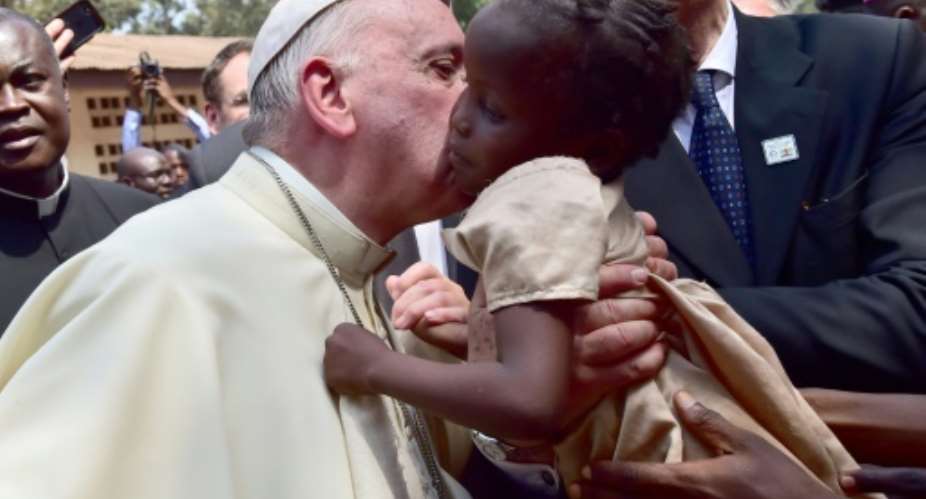Bangui (Central African Republic) (AFP) - Pope Francis brought a message of peace to divided Central African Republic on Sunday, visiting people displaced by months of bloody sectarian violence and calling for unity.
"I come to the Central African Republic as a pilgrim of peace and as an apostle of hope," the 78-year-old pontiff said on arriving in one of Africa's poorest and most unstable countries for a 24-hour visit fraught with safety concerns.
Crowds burst into cheers and singing as his plane touched down in Bangui from Uganda on the final leg of his three-country tour of Africa, which he hailed as "the continent of hope." He began his visit Wednesday in Kenya.
For the short ride to the presidential palace in Bangui, the pontiff travelled in his open-topped popemobile, with huge crowds, many of them children and young people, cheering wildly as he passed, some waving branches in a sign of peace.
At the palace he met with acting president Catherine Samba-Panza, who begged his forgiveness for the wave of "evil" sectarian violence that has devastated the country.
"Central Africans have inflicted unspeakable suffering on other Central Africans," she said.
"On behalf of the ruling class of this country but also in the name of everyone who has played any part in this descent into hell, I confess all the evil that has been done here throughout the course of history and ask for forgiveness from the bottom of my heart."
In his own address, Francis called for unity, urging the people to avoid "the temptation of fear of others, of the unfamiliar, of what is not part of our ethnic group, our political views or our religious denomination."
He also said he hoped the upcoming elections would allow the country to peacefully begin a "new chapter".
"It is my fervent wish that the various national consultations to be held in coming weeks will enable the country to embark serenely on a new chapter of its history," he said ahead of a first round of presidential and legislative elections which on December 27.
The country descended into bloodshed more than two years ago after longtime Christian leader Francois Bozize was ousted by rebels from the mainly Muslim Seleka force, triggering the worst crisis since independence in 1960.
Since then, the former French colony has been gripped by violence between ex-Seleka members and Christian "anti-balaka" militias.
- A sea of hands -
The leader of the world's 1.2 billion Catholics then went on to visit the Saint-Sauveur camp for displaced people in central Bangui. The camp is home to about 3,000 people.
UN figures show close to 450,000 people remain internally displaced by the conflict.
As he entered the camp, a sea of hands reached out to him as he wandered past a crowd packed with children and parents holding their toddlers out towards him.
Beaming in delight, the pontiff reached out and laid his hands on the children's heads in a gesture of blessing.
"We are very pleased to see the pope," said Fidele Nodjindorom.
"He knows that things have happened in our country and maybe he has come to ask God to save us."
Later on Sunday, Francis will attend a prayer vigil outside Bangui's Notre Dame Cathedral and a day later will celebrate a huge mass at the city's 20,000-seat Barthelemy Boganda Stadium.
Ahead of the mass he will meet members of the Muslim community and visit a mosque in Bangui's flashpoint PK5 district, a maze of red dirt roads and flimsy shacks at the heart of the latest violence in the coup-prone country's history.
The area saw an unprecedented wave of attacks pitting majority Christians against minority Muslims in late 2013 and early last year.
Concerns about the pope's safety have been paramount, with the pope's chief bodyguard locked in days of consultations with local security forces.
"Everything has been done to ensure the safety of the pope... there is no real threat," said Public Security Minister Chrysostome Sambia.
Ilaria Allegrozzi of rights group Amnesty International said the pope "has a real opportunity to call for the protection of civilians of all faiths, and use his great moral authority to help reduce the tension that has recently resulted in deadly violence".





 Power outages: Always give 3 days prior notice — PURC to ECG
Power outages: Always give 3 days prior notice — PURC to ECG
 NDC's quest to wrestle power from NPP goes beyond partisanship; it’s a national ...
NDC's quest to wrestle power from NPP goes beyond partisanship; it’s a national ...
 ECG board members slapped GHS5.8 million fine by PURC for failing to alert publi...
ECG board members slapped GHS5.8 million fine by PURC for failing to alert publi...
 I never left NPP, they 'sacked' me for attending Alan's programme; even a $100mi...
I never left NPP, they 'sacked' me for attending Alan's programme; even a $100mi...
 Fuel prices go up today
Fuel prices go up today
 Anti-gay bill: Your stance serves no purpose; either you actively advocate for t...
Anti-gay bill: Your stance serves no purpose; either you actively advocate for t...
 Tension brews as NPP Seattle clashes with national leadership over parallel chap...
Tension brews as NPP Seattle clashes with national leadership over parallel chap...
 Anti-gay bill: You've done nothing in Ghana to prove you're against LGBTQ+; ther...
Anti-gay bill: You've done nothing in Ghana to prove you're against LGBTQ+; ther...
 We’re disappointed over gov’t’s lacklustre attitude to negotiations of our condi...
We’re disappointed over gov’t’s lacklustre attitude to negotiations of our condi...
 Transport Ministry has no power to determine fares – COPEC
Transport Ministry has no power to determine fares – COPEC
